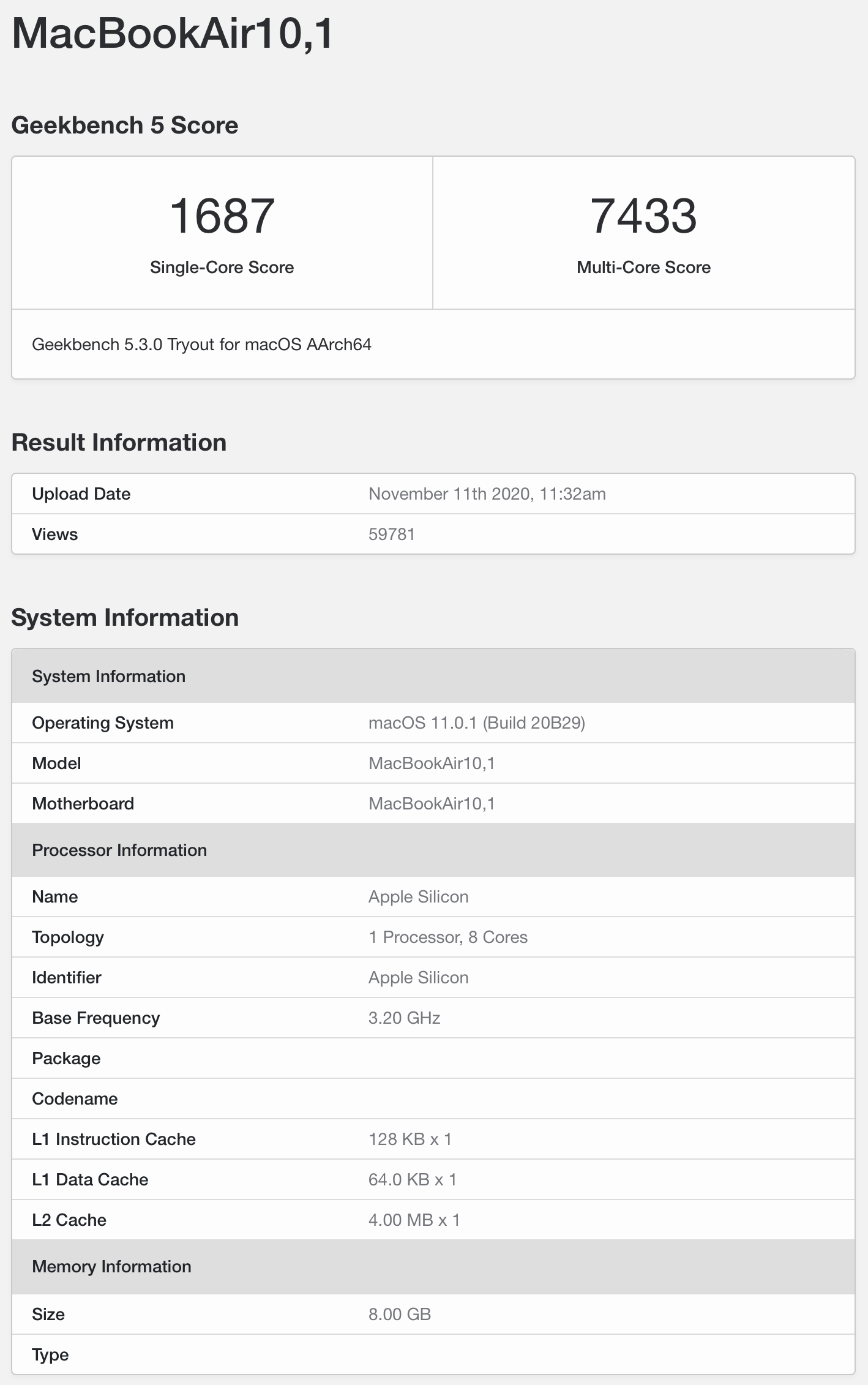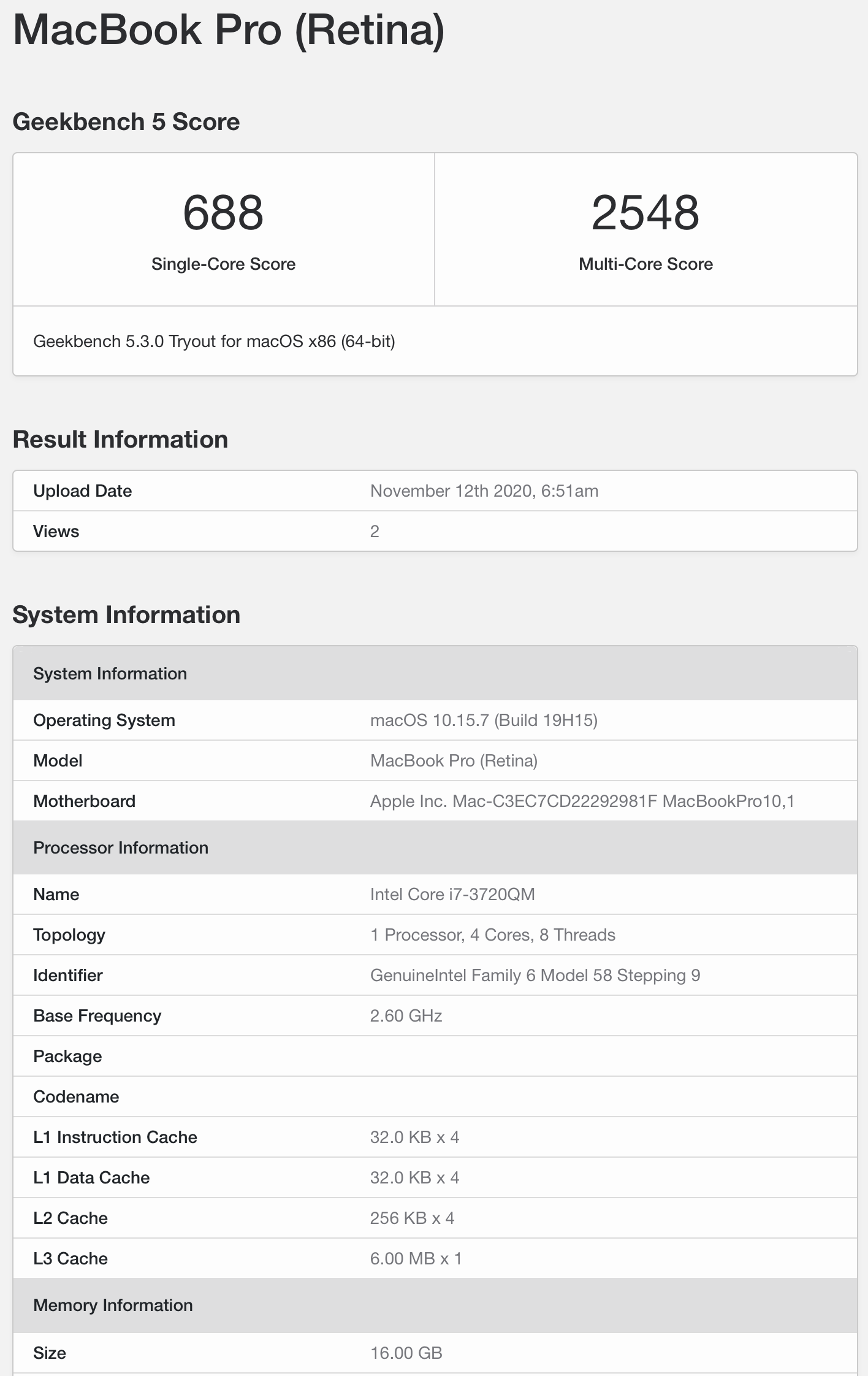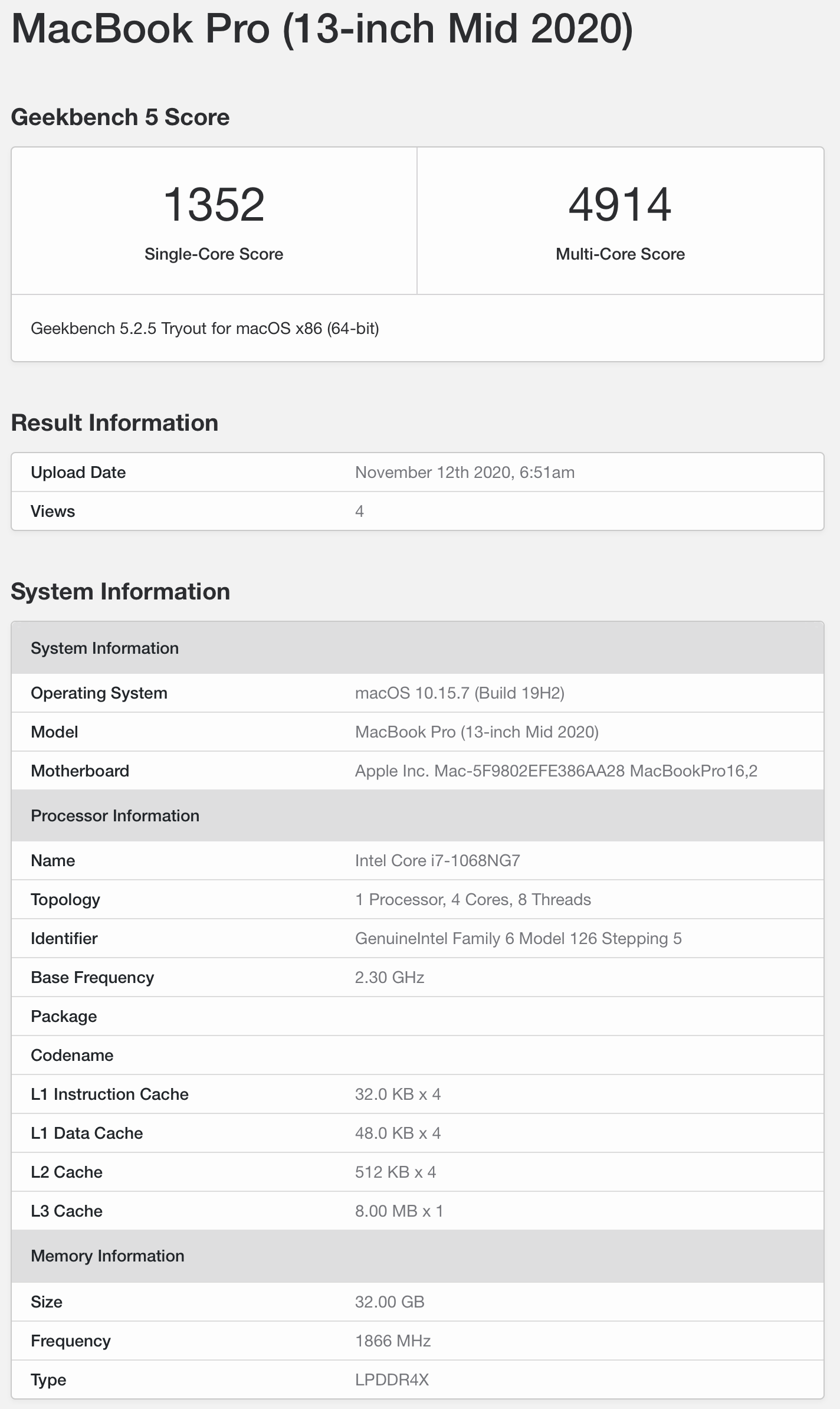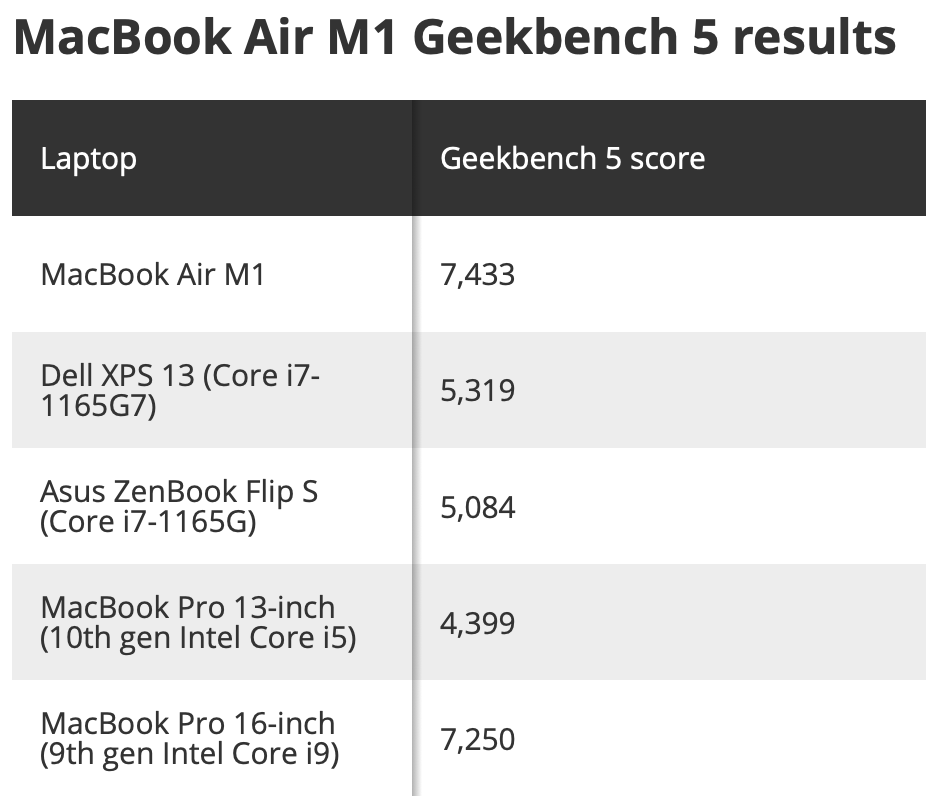Apple’s M1 chip fastest laptop CPU in the world
-
@Klaus said in Apple’s M1 chip fastest laptop CPU in the world:
You can already execute iOS code on Intel chips. Just start an iOS virtual machine
I suppose one could jump through those hoops, but if I could just click on an app that's installed on my phone and run it on my Mac, that would be simple and a big selling points for those who don't know what a "virtual machine" is.
@George-K said in Apple’s M1 chip fastest laptop CPU in the world:
@Klaus said in Apple’s M1 chip fastest laptop CPU in the world:
You can already execute iOS code on Intel chips. Just start an iOS virtual machine
I suppose one could jump through those hoops, but if I could just click on an app that's installed on my phone and run it on my Mac, that would be simple and a big selling points for those who don't know what a "virtual machine" is.
They could very easily make it such that it's just a click on the Mac now. In fact, there's loads of X86 code which those Macs need to execute and the way they execute it is also via some kind of virtualization/emulation/simulation. The main advantage of supporting it directly would be potentially higher speed, but iOS applications usually have fewer resources than what a laptop offers. Overall, I think the main business case for those processors is something else, such as maybe power savings or just good old politics.
-
Note the MacBook Air has only 8GB of RAM
https://browser.geekbench.com/v5/cpu/4648107

Here's the 2020 16-inch MacBook Pro (i7)
https://browser.geekbench.com/v5/cpu/4665711
-
The 2020 Macbook pro uses the Intel Core i7-3720QM - isn't that a really old processor?
-
I don't quite understand why the single core score is so much higher.
The base frequency is a little higher, ok. The caches are significantly bigger, that might make a difference. But I find it hard to imagine that the new chip can do that much more per cycle.
-
-
Yeah, it is impressive. It's not so clear, though, how well that translates into real-world performance. These are all synthetic benchmarks.
One should also add that Intel/AMD desktop/server CPUs are still way faster. The fastest AMD CPUs have a multi-core score of around 60,000.
I personally have always "philosophically" preferred RISC over CISC CPUs. It's nice to see RISC so much on the rise.
-
Yeah, it is impressive. It's not so clear, though, how well that translates into real-world performance. These are all synthetic benchmarks.
One should also add that Intel/AMD desktop/server CPUs are still way faster. The fastest AMD CPUs have a multi-core score of around 60,000.
I personally have always "philosophically" preferred RISC over CISC CPUs. It's nice to see RISC so much on the rise.
@Klaus said in Apple’s M1 chip fastest laptop CPU in the world:
The fastest AMD CPUs have a multi-core score of around 60,000.
I have no doubt that there are many, many, "faster" chips.
The chip is just one part of the equation, see my "Big Sur" thread.
OTOH, that AMD CPU that scores 60K, is that available in a consumer machine for less than $2K?
-
@George-K said in Apple’s M1 chip fastest laptop CPU in the world:
OTOH, that AMD CPU that scores 60K, is that available in a consumer machine for less than $2K?
No, of course not. I merely wanted to point out that this is not "the fastest CPU ever" or something, which somebody may prematurely conclude when looking at the numbers.
-
Yeah, it is impressive. It's not so clear, though, how well that translates into real-world performance. These are all synthetic benchmarks.
One should also add that Intel/AMD desktop/server CPUs are still way faster. The fastest AMD CPUs have a multi-core score of around 60,000.
I personally have always "philosophically" preferred RISC over CISC CPUs. It's nice to see RISC so much on the rise.
@Klaus intel chips are x86 chips (30 year old basic design). They have to dedicate silicon to compatibility with legacy commands, pipelines. Then there are some other features like virtualization which are important for business applications, that benefit from hardware acceleration (but are wasted if you don’t use it).
So in short - intel has a lot of design legacy to deal with and can’t just optimize for today’s common workloads.
-
@George-K said in Apple’s M1 chip fastest laptop CPU in the world:
OTOH, that AMD CPU that scores 60K, is that available in a consumer machine for less than $2K?
No, of course not. I merely wanted to point out that this is not "the fastest CPU ever" or something, which somebody may prematurely conclude when looking at the numbers.
-
@Klaus intel chips are x86 chips (30 year old basic design). They have to dedicate silicon to compatibility with legacy commands, pipelines. Then there are some other features like virtualization which are important for business applications, that benefit from hardware acceleration (but are wasted if you don’t use it).
So in short - intel has a lot of design legacy to deal with and can’t just optimize for today’s common workloads.
@xenon said in Apple’s M1 chip fastest laptop CPU in the world:
So in short - intel has a lot of design legacy to deal with and can’t just optimize for today’s common workloads
I don’t think that this is the main factor. CISC vs RISC, that’s the big difference.
-
@Klaus said in Apple’s M1 chip fastest laptop CPU in the world:
that this is not "the fastest CPU ever"
Fair enough.
Perhaps the "Fastest CONSUMER CPU ever?"
-
@George-K said in Apple’s M1 chip fastest laptop CPU in the world:
Perhaps the "Fastest CONSUMER (except Mark’s) CPU ever?"
FIFY.
@Klaus said in Apple’s M1 chip fastest laptop CPU in the world:
@George-K said in Apple’s M1 chip fastest laptop CPU in the world:
Perhaps the "Fastest CONSUMER (except Mark’s) CPU ever?"
FIFY.
LOL
-
@xenon said in Apple’s M1 chip fastest laptop CPU in the world:
So in short - intel has a lot of design legacy to deal with and can’t just optimize for today’s common workloads
I don’t think that this is the main factor. CISC vs RISC, that’s the big difference.
-
@xenon said in Apple’s M1 chip fastest laptop CPU in the world:
So in short - intel has a lot of design legacy to deal with and can’t just optimize for today’s common workloads
I don’t think that this is the main factor. CISC vs RISC, that’s the big difference.
@Klaus said in Apple’s M1 chip fastest laptop CPU in the world:
@xenon said in Apple’s M1 chip fastest laptop CPU in the world:
So in short - intel has a lot of design legacy to deal with and can’t just optimize for today’s common workloads
I don’t think that this is the main factor. CISC vs RISC, that’s the big difference.
Not necessary a conflict between @xenon and @Klaus' points. Not hard to imagine, with the smaller transistor feature sizes today, that you can pack legacy Intel x86 CISC cores and AArchx64 RISC cores into the same die and have one chip that runs both instruction sets while sharing on-chip common caches and I/Os. Coming up with an OS that can simultaneously take manage both will take more work. The business/legal folks have to remove commercial and legal/cross-licensing impediments, but technically something like this can be done.
As a guy who keeps a Windows VM on my x86 Mac to run Windows, I really want to have a Mac option let me run a Windows VM on my future Mac. Not that it's urgent, I can wait a few years. I am just not confident that Apple will find sufficient commercial incentives to build a M-series chip Mac that can also run Windows and craft a version of macOS that can simultaneously manage AArch-64 and x86 cores. (Though, seeing how macOS can make use of an external GPU, maybe extending that framework to make use of an external x86 CPU isn't all that far fetched.) Else we'll have to resort of using software to emulate an x86 PC inside a macOS. The performance will take a hit and the CPU may be made unnecessarily busy then, but I suppose that will still be better than me having to maintain a separate machine just to run a Windows application.
-
https://www.macrumors.com/2020/11/15/m1-chip-emulating-x86-benchmark/
Got a chart there that shows the benchmark of M1-based MacBook Air running Geekbench in Rosetta 2:
/article-new/2020/11/rosetta-2-m1-benchmark-single-core.jpg)
-
I saw that too. As I said earlier, I had no problems with the PowerPC/Intel transition. Rosetta worked just fine. Rmarkably well, as a matter of fact.
I have little doubt that Rosetta 2 will not be as good.
But, when your software runs faster in emulation than on native hardware. that's amazing.
-
I saw that too. As I said earlier, I had no problems with the PowerPC/Intel transition. Rosetta worked just fine. Rmarkably well, as a matter of fact.
I have little doubt that Rosetta 2 will not be as good.
But, when your software runs faster in emulation than on native hardware. that's amazing.
@George-K said in Apple’s M1 chip fastest laptop CPU in the world:
But, when your software runs faster in emulation than on native hardware. that's amazing.
Yes, that's bound to happen given enough time, like MS-DOS can run faster in an emulator on a modern computer than it could natively on an Intel 8088 PC XT from the 80s. I just was not sure how long that would take, so it's good to see these benchmarks.

